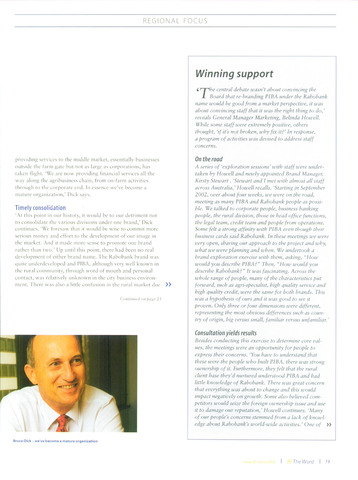Winning support
REGIONAL FOCUS
Timely consolidation
On the road
Consultation yields results
providing services to the middle market, essentially businesses
outside the farm gate but not as large as corporations, has
taken flight. 'We are now providing financial services all the
way along the agribusiness chain, from on-farm activities
through to the corporate end. In essence we've become a
mature organization,' Dick says.
'At this point in our history, it would be to our detriment not
to consolidate the various divisions under one brand,' Dick
continues. "We foresaw that it would be wise to commit more
serious money and effort to the development of our image in
the market. And it made more sense to promote one brand
rather than two.' Up until this point, there had been no real
development of either brand name. The Rabobank brand was
quite underdeveloped and PIBA, although very well known in
the rural community, through word of mouth and personal
contact, was relatively unknown in the city business environ
ment. There was also a little confusion in the rural market due
Continued on page 21
Bruce Dick - we've become a mature organization
irT~'be central debate wasn't about convincing the
X Board that re-branding PIBA under the Rabobank
name would be good from a market perspective, it was
about convincing staff that it was the right thing to do,'
reveals General Manager Marketing, Belinda Howell.
While some staff were extremely positive, others
thought, 'if it's not broken, why fix it?' In response,
a program of activities was devised to address staff
concerns.
A series of 'exploration sessions' with staff were under-
taken by Howell and newly appointed Brand Manager,
Kirsty Stewart'Stewart and l met with almost all staff
across Australia,Howell recalls. 'Starting in September
2002, over about four weeks, we were on the road,
meeting as many PIBA and Rabobank people as possi-
ble. We talked to corporate people, business banking
people, the rural division, those in head office functions,
the legal team, credit team and people from operations.
Some feit a strong affinity with PIBA even though their
business cards said Rabobank. In these meetings we were
very open, sharing our approach to the project and why,
what we were planning and when. We undertook a
brand exploration exercise with them, asking, "How
would you describe PIBA?" Then, "How would you
describe Rabobank?" It was fascinating. Across the
whole range of people, many of the characteristics put
forward, such as agri-specialist, high quality service and
high quality credit, were the same for both brands. This
was a hypothesis of ours and it was good to see it
proven. Only three or four dimensions were different,
representing the most obvious differences such as coun
try oforigin, big versus small, familiar versus unfamiliar.'
Besides conducting this exercise to determine core val-
ues, the meetings were an opportunity for people to
express their concerns. 'You have to understand that
these were the people who built PIBA, there was strong
ownership of it. Furthermore, they feit that the rural
cliënt base they'd nurtured understood PIBA and had
little knowledge of Rabobank. There was great concern
that everything was about to change and this would
impact negatively on growth. Some also believed com-
petitors would seize the foreign ownership issue and use
it to damage our reputation,Howell continues. 'Many
of our people's concerns stemmed from a lack of knowl
edge about Rabobank's world-wide activities.' One of
The Word I 19

